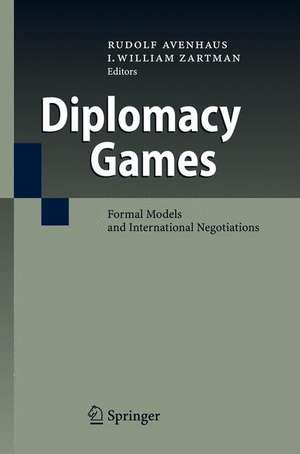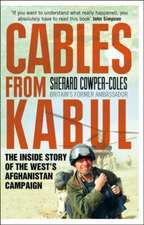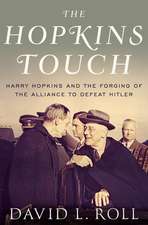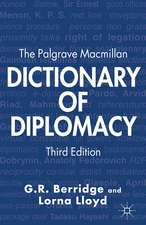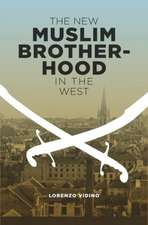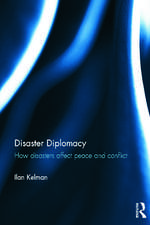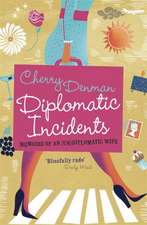Diplomacy Games: Formal Models and International Negotiations
Editat de Rudolf Avenhaus, I. William Zartmanen Limba Engleză Hardback – 14 mai 2007
| Toate formatele și edițiile | Preț | Express |
|---|---|---|
| Paperback (1) | 948.16 lei 6-8 săpt. | |
| Springer Berlin, Heidelberg – 13 oct 2010 | 948.16 lei 6-8 săpt. | |
| Hardback (1) | 953.65 lei 6-8 săpt. | |
| Springer Berlin, Heidelberg – 14 mai 2007 | 953.65 lei 6-8 săpt. |
Preț: 953.65 lei
Preț vechi: 1162.99 lei
-18% Nou
Puncte Express: 1430
Preț estimativ în valută:
182.48€ • 191.01$ • 151.88£
182.48€ • 191.01$ • 151.88£
Carte tipărită la comandă
Livrare economică 31 martie-14 aprilie
Preluare comenzi: 021 569.72.76
Specificații
ISBN-13: 9783540683032
ISBN-10: 3540683038
Pagini: 372
Ilustrații: XX, 350 p. 37 illus.
Dimensiuni: 155 x 235 x 29 mm
Greutate: 0.68 kg
Ediția:2007
Editura: Springer Berlin, Heidelberg
Colecția Springer
Locul publicării:Berlin, Heidelberg, Germany
ISBN-10: 3540683038
Pagini: 372
Ilustrații: XX, 350 p. 37 illus.
Dimensiuni: 155 x 235 x 29 mm
Greutate: 0.68 kg
Ediția:2007
Editura: Springer Berlin, Heidelberg
Colecția Springer
Locul publicării:Berlin, Heidelberg, Germany
Public țintă
ResearchDescriere
In this book, leading experts in international negotiations present formal models of conflict resolution and international negotiations. Besides the description of different models and approaches, the book answers three questions: How can the abstract concepts and results of rational choice theorists be made more understandable and plausible to political and social scientists not trained to work with formal models? What can be done to encourage practitioners to use not only simple but also mathematically advanced approaches in their analysis of real world negotiation problems? How can practitioners (e.g., politicians and diplomats) become interested in, take into account, and apply formal models of their more important problems?
Cuprins
Introduction: Formal Models of, in, and for International Negotiations.- Introduction: Formal Models of, in, and for International Negotiations.- General Evaluations.- Game Models of Peace and War: Some Recent Themes.- Formal Models of Intervention: A Stocktaking and Analysis of the Implications for Policy.- Rationality of Choice versus Rationality of Knowledge.- Negotiation Models and Applications.- Models of International Negotiations.- A Dynamical Systems Model of Small Group Decision Making.- Formal Methods for Forecasting Outcomes of Negotiations on Interstate Conflicts.- Bridging Games and Diplomacy.- Greek-Turkish Territorial Waters Game.- Models in International Negotiations.- Some Lessons from the Use of the RAINS Model in International Negotiations.- Converting Competition to Collaboration: Creative Applications of Models in the Law of the Sea Negotiations.- Models for International Negotiations.- International Negotiations on Climate Change: A Noncooperative Game Analysis of the Kyoto Protocol.- The Graph Model for Conflict Resolution as a Tool for Negotiators.- A Minimax Procedure for Negotiating Multilateral Treaties.- “Adjusted Winner” (AW) Analyses of the 1978 Camp David Accords—Valuable Tools for Negotiators?.- Procedural Design for Conflict Resolution.- Conclusion: Lessons for Theory and Practice.
Textul de pe ultima copertă
In this book, leading experts in international negotiations present formal models of conflict resolution and international negotiations. Besides the description of different models and approaches, the book answers three questions: How can the abstract concepts and results of rational choice theorists be made more understandable and plausible to political and social scientists not trained to work with formal models? What can be done to encourage practitioners to use not only simple but also mathematically advanced approaches in their analysis of real world negotiation problems? How can practitioners (e.g., politicians and diplomats) become interested in, take into account, and apply formal models of their more important problems?
Caracteristici
Broad range of formal models for international negotiations
Incentives for diplomats to use formal models and approaches
Includes supplementary material: sn.pub/extras
Incentives for diplomats to use formal models and approaches
Includes supplementary material: sn.pub/extras
